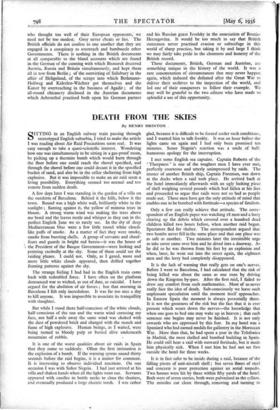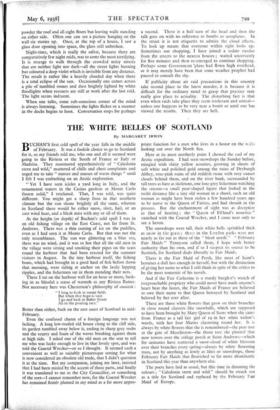DEATH FROM THE SKIES
By HENRY BRINTON
SITTING in an English railway train passing through stereotyped English suburbia, I tried to make the article I was reading about Air Raid Precautions seem real. It was easy enough to take a quasi-scientific interest. Wondering how one was simultaneously to be sitting in a gas-proof room, be picking up a thermite bomb which would burn through the floor before one could reach the shovel specified, and through the shovel before one could decant it in the specified bucket of sand, and also be in the cellar sheltering from high explosive. But it was impossible to make an air raid seem a living possibility. Everything seemed too normal and too remote from sudden death.
A few days later I was standing in the garden of a villa on the outskirts of Barcelona. Behind it the hills, below it the town. Round was a high white wall, brilliantly white in the sunlight ; flaming against it, the yellow of mimosa trees in bloom. A strong warm wind was making the trees above me bend and the leaves rustle and whisper as they can in the perfect English June we so rarely see. In the sky Of deep Mediterranean blue were a few little round white clouds like puffs of smoke. As a matter of fact they were smoke, smoke from bursting shells. A group of servants and chauf- feurs and guards in bright red berets—it was the house of \ the President of the Basque Government—were looking and pointing excitedly at the sky. Some of them could see the raiding planes. I could not. Only, as I gazed, more and more little white clouds appeared, then drifted together forming patterns against the sky.
The strange feeling I had had in the English train came back with redoubled force. I have often on the platform denounced war as wicked, as out of date, as suicidal. I have argued for the abolition of air forces ; but that morning in Barcelona I felt only incredulous. It was far too nice a day to kill anyone. It was impossible to associate its tranquillity with slaughter.
But while I stood there half-conscious of the white clouds, half-conscious of the sun and the warm wind caressing my face, not half a mile away the same wind was choked with the dust of powdered brick and charged with the stench and fume of high explosive. Human beings, as I waited, were being turned to bloody pulp or buried alive underneath mountains of rubble.
It is one of the worst qualities about air raids in Spain that they come so suddenly. Often the first intimation is the explosion of a bomb. If the warning syrens sound thirty seconds before the raid begins, it is a matter for comment. It is interesting to observe individual reactions. On one occasion I was with Seflor Negrin. I had just arrived .at his villa and shaken hands when all the lights went out. Servants appeared with candles in bottle necks to close the shutters, and eventually produced a large electric torch. I was rather glad, because it is difficult to be formal under such conditions, and I wanted him to talk frankly. It was an hour before the lights came on again and I had only been promised ten minutes. Senor Negrin's _reaction was a smile _ of half: humorous apology for the interruption.
I met some English sea captains. Captain Roberts of the Thorpness ' is one of the toughest men I have ever met, perfectly courteous and utterly unimpressed by raids. The master of another British ship, Captain Foreman, was down at the docks when a raid took place. He arrived back at the hotel immediately afterwards with an ugly looking piece of shell weighing several pounds which had fallen at his feet and proceeded to argue that raids were not so bad as people made out. These men have got the only attitude of mind that enables one to be bombed with fortitude—a species of fatalism.
Only a few can really achieve that attitude. The corre- spondent of an English paper was watching x8 men and a lorry clearing up the debris which covered over a hundred dead children killed two hours before, when another raid began. Spectators fled for shelter. The correspondent argued that two bombs never fell in the same place and that one place was as safe as another. Two minutes later the irresistible urge to take cover came over him and he dived into a doorway. As he did so he was thrown from his feet by an explosion and when, later, he went out into the street again, the eighteen men and the lorry had completely disappeared.
It is the lack of warning that really gets on one's nerves. Before I went to Barcelona, I had calculated that the risk of being killed was about the same as one runs by' driving down the Kingston by-pass; After the first raid, I failed to draw any comfort from such mathematics. Most of us never really face the idea of death. Sub-consciously we leave such unpleasant speculation until the moment itself approaches. In Eastern Spain the moment is always potentially there. It is not the greatness of the risk but the fact that it is ever present which wears down the nerves—the knowledge that when one goes to bed one may wake up in heaven ; that each sentence one begins may never be finished. It is not only cowards who are oppressed by this fear. In my hotel was a Spaniard who had earned medals for gallantry in the Moroccan War. More than that, he had spent a year in the Telefonica in Madrid, the most shelled and bombed building in Spain. He could still hear a raid with outward fortitude, but it made himphysically sick. When I met him he had not set foot outside the hotel for three weeks.
It is in fact safer to be inside during a raid, because of the falling pieces of anti-aircraft shell ; but seven floors of steel and concrete is poor protection against an aerial torpedo. Two houses' were hit by these within fifty yards of the hotel. Both were of seven stories, both were pulverised to the cellars. The missiles cut clean through, removing and- turning to powder the roof and all eight floors but leaving walls standing on either side. Often one can see a picture hanging on the wall six stories up. Once, at the, top of a house, I saw a glass door opening into space, the glass still unbroken.
Night-time, which is really the safest, because there are comparatively few night raids, was to some the most terrifying. It is strange to walk through the crowded noisy streets that are neither light nor dark—all the street lights burning but coloured a deep violet which is invisible from any distance. The result is rather like a heavily clouded day when there is a total eclipse of the sun. Occasionally one comes across a pile of tumbled stones and dust brightly lighted by white floodlights when rescuers are still at work after the last raid. The light seems indecent.
When one talks, some sub-conscious corner of the mind is always listening. Sometimes the lights flicker or a steamer in the docks begins to hoot. Conversation stops for perhaps a second. There is a half turn of the head and then the talk goes on with no reference to bombs or aeroplanes. In the street it is not etiquette to admire the cloud effects. To look up means that everyone within sight looks up. Sometimes out shopping, I have joined a sedate exodus from the streets to the nearest houses ; waited uncertainly for five minutes and then re-emerged to continue shopping. Perhaps some Government 'plane had flown high overhead, or it may merely have been that some weather prophet had paused to consult the sky.
If publicity about air raid precautions in this country take second place to the latest murder, it is because it is difficult for the ordinary mind to grasp that practice may really give place to actuality. The disturbing fact is that even when raids take place they seem irrelevant and unreal— unless one happens to be very near a bomb or until one has viewed the results. Then they are hell.



































































 Previous page
Previous page